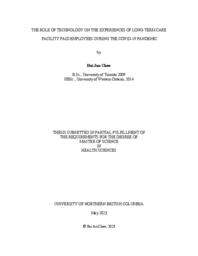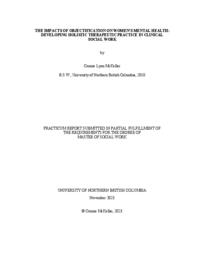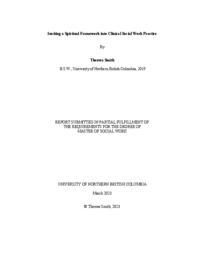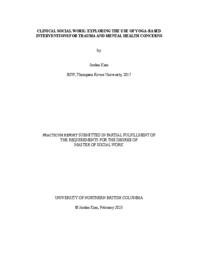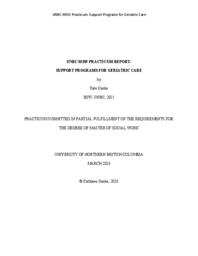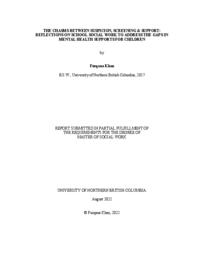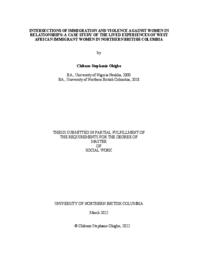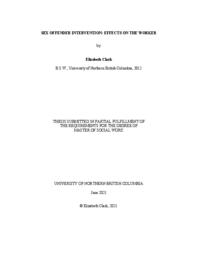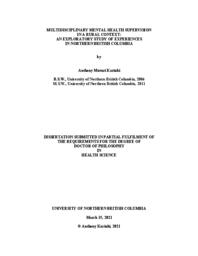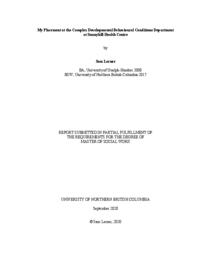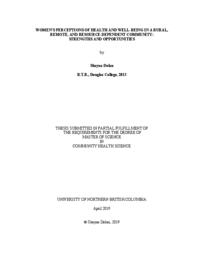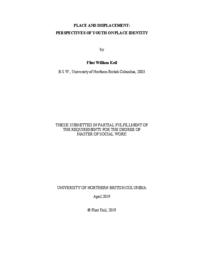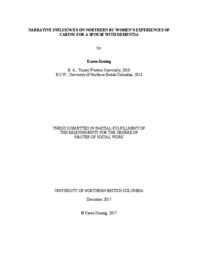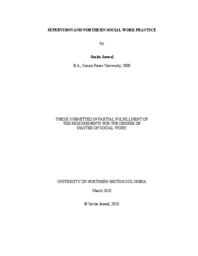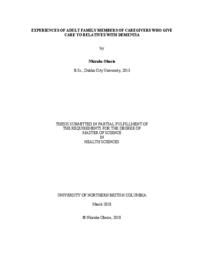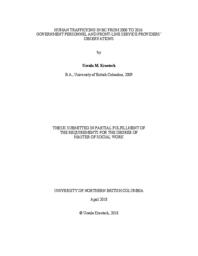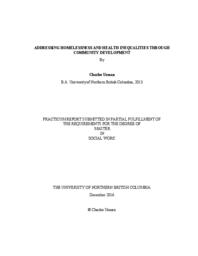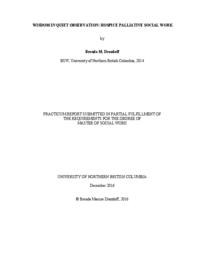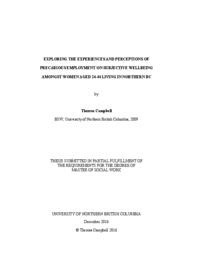Hemingway, Dawn
Person Preferred Name
Dawn Hemingway
Related Works
Content type
Digital Document
Origin Information
Content type
Digital Document
Origin Information
Content type
Digital Document
Description / Synopsis
The COVID-19 pandemic led to substantial changes in technology use within the long-term care (LTC) sector in Canada. The purpose of this research was to describe the use of technology and its impact on the experiences of LTC staff working in northern British Columbia (B.C.) during the COVID-19 pandemic. A secondary analysis of one-hour semi-structured interviews from 53 participants was conducted. Data was analysed thematically guided by Braun and Clarke’s thematic analysis approach. The experiences of LTC staff varied across disciplines and work roles. LTC staff reported using technologies for inter-department, intra-department or inter-professional communications, as well as to enhance residents’ social interactions. Findings provide insight into the perspectives of LTC staff who had to adopt new technologies and new work processes during COVID-19, thus informing and providing actionable insights for those working in northern B.C.
Origin Information
Content type
Digital Document
Description / Synopsis
no abstract available
Origin Information
Content type
Digital Document
Origin Information
Content type
Digital Document
Description / Synopsis
My practicum placement took place at Cottonwood Creek Wellness in Nelson, British Columbia where I began working alongside my practicum supervisor, Catherine Williams, who provides therapeutic support to families, children, and youth. Her services include offering specialized counselling in the areas of Attachment, working with parents, Family Therapy, Infant Mental Health, and assessment and treatment of all forms of Anxiety. My objective within my practicum was to practice from a holistic and trauma-informed perspective and to gain an understanding of how alternative therapies, such as yoga-based interventions can be incorporated into clinical social work practice. Not only did my experience as an MSW student provide me amples of opportunities to explore how to use complementary treatment modalities with clients, but it also allowed me to witness their efficacy when integrated into the therapeutic process in a purposeful, open, and creative manner.
Origin Information
Content type
Digital Document
Description / Synopsis
no abstract available
Origin Information
Content type
Digital Document
Description / Synopsis
Children often slip through the cracks in the systems when they display disruptive behaviours in classrooms but have no mental health diagnoses. Without medical explanations for behaviours, which may or may not be warranted, students face suspensions or removal from schools possibly leading to poorer life outcomes. There can be as many reasons for disruptive behaviours – undiagnosed mental illnesses, childhood adversity, life transitions, and more – as there can be justifications for not diagnosing children at a young age: labeling, stigma, apprehension from parents, and so on. Often supports for students require them to have diagnoses. This report details my practicum experience within the Social Work Program in the Indigenous Education Department of School District #57 in Prince George, British Columbia (BC). It is an exploration of the role of Indigenous Social Workers as they navigate the myriad of situations they face when working with students who frequently display disruptive behaviours.
Origin Information
Content type
Digital Document
Description / Synopsis
This research is for the researcher’s graduate thesis, as a requirement to obtain a Master of Social Work degree. The thesis research was conducted via distance (using telephone and password-protected audio conferencing) with four immigrant women. Using a case study approach and framed by socialist feminist intersectional theories and transformative framework, this thesis examines the intersections of immigration and violence against women in relationships (VAWIR) on multiple axis including gender, race, class, immigrant, and economic status to better understand factors that shape the experiences of visible minority immigrant women dealing with domestic violence and abuse. The findings of this thesis would contribute to different viewpoints on the experiences of VAWIR among immigrant women and bring more understanding to a variety of ways immigrant women respond to and cope with violence in their relationships as well as shape future policies and practices to more effectively service immigrant women of African descent.
Origin Information
Content type
Digital Document
Description / Synopsis
This thesis examines the enthusiasm and motivations for home canning in the twenty-first century within the context of the DIY movement of the 1990s and the current urban homesteading movement. Using interdisciplinary methodological approaches, including feminist history, feminist auto/biography, and autoethnography, the author provides historical background on home canning and homesteading in Canada and the United States; she also uses her own lived experiences of canning and gardening while pursing an MA in Gender Studies to analyze choice feminism. This thesis examines criticisms of the current interest in home canning by journalists, and the reactions of canning/urban homesteading bloggers to those articles. Ultimately this thesis argues that canning is a valuable skill and that feminism and foodwork are not incompatible; furthermore, blogging about canning and urban homesteading is breaking down the divide between the public and private spheres by providing an income for some bloggers through advertising and book deals.
Origin Information
Content type
Digital Document
Description / Synopsis
This paper describes a qualitative study involving six participants who work in the field of sex offender intervention. Participants’ struggles and professional rewards are examined. Recommendations on workplace policy and procedure adjustments are made based on the findings. Although participants identified rewards of their work, they described many physical, emotional, and mental health struggles they encountered, because of their employment. They also identified supports that promoted their wellbeing in the work.
Origin Information
Content type
Digital Document
Description / Synopsis
The purpose of this study was to better understand how multidisciplinary mental health supervision might work in rural remote settings. There is a need for supervisory approaches that address the unique contextual challenges in rural and remote multidisciplinary service delivery, such as management approaches, isolation, and lack of support. This study focused on three areas linked to multidisciplinary mental health supervision: challenges and opportunities, role perception, and differences in approaches. This study also attempted to reconcile the core supervisory requirements with the contextual challenges. The few studies on rural remote supervision have primarily focused on general internal and external factors facing rural remote professionals. Despite its importance, knowledge of how multidisciplinary rural remote supervisors perceive and/or appreciate their roles is limited. This study was informed by social construction and symbolic interaction theories, and guided by three research questions: 1) What challenges and opportunities do mental health supervisors experience in northern British Columbia? 2) How do frontline workers, supervisors, and senior managers perceive the roles and activities of mental health supervisors in northern British Columbia? 3) How are supervisory approaches in various mental health disciplines different or similar in northern British Columbia? The research methodology was qualitative and the study design adopted an interpretive, social interactionist approach. Source triangulation enhanced both the credibility and transferability of the findings. The sources included three participant groups: frontline mental health workers, mental health supervisors, and senior mental health managers. Another triangulation source was the context and setting review of BC’s complex mental health jurisdictions. Triangulation was also achieved by interviewing participants who worked in different settings, organizations, and geographic locations. Thematic analysis was used for data analysis resulting in 11 manifest themes and the following five latent themes: Difficult, overwhelming responsibilities; stressful, complicated decision making; the endless campaign for professional leadership support; mentorship in remote practice; and a struggle in collaborative plurality. Most of the participants expressed the wish for more support in their professional work. The findings from this study provide employers with new insights into multidisciplinary supervisory work and also emphasize the need for practical and specific ideas for much needed support for rural remote supervisors.
Origin Information
Content type
Digital Document
Description / Synopsis
My practicum at the Sunnyhill Complex Developmental and Behavioural Conditions Department has taught me about the role of Social Work within an interdisciplinary team in a medical setting, and the value of aligning with the needs and strengths of families and caregivers. This practicum has also informed me on the function of a diagnosis in determining community supports. My preparatory research included youth with developmental disabilities, the assessment process, the need for more significant structural support, the life-needs model, the portage model, how to support families and caregivers, social work within an interdisciplinary team, mindfulness and outcome evaluations. My learning experience has implications for my future practice working within interdisciplinary teams. In my future work, I aspire to promote social justice and ethical practice by using my skills and expertise of external and community resources to overcome barriers in culturally sensitivity ways that honours the client’s unique strengths, needs, and their selfdetermination. My experience and learning enriched my professional capacity and my appreciation of the value of Social Work in supporting families and individuals.
Origin Information
Content type
Digital Document
Description / Synopsis
This research sought to explore the perceptions of health and well-being for women in a rural and remote northeastern British Columbia community experiencing intense social, ecological, and economic change as a result of its dependence on natural resource extraction. Designed as a qualitative inquiry into the health of local women, this research is informed by social constructivism, feminist theory, and ecosystems approaches to health. Engagement with participants and data collection was heavily influenced by Appreciative Inquiry, a strengths-based approach that identifies assets within a given system with the aim of contributing to positive change. Findings indicate that equitable access, perceptions of people and place, and leadership, communication, and collaboration are factors that strongly impact women’s health and in this context.
Origin Information
Content type
Digital Document
Origin Information
Content type
Digital Document
Origin Information
Content type
Digital Document
Origin Information
Content type
Digital Document
Origin Information
Content type
Digital Document
Origin Information
Content type
Digital Document
Origin Information
Content type
Digital Document
Origin Information
Content type
Digital Document
Origin Information
Content type
Digital Document
Origin Information
Content type
Digital Document
Origin Information



